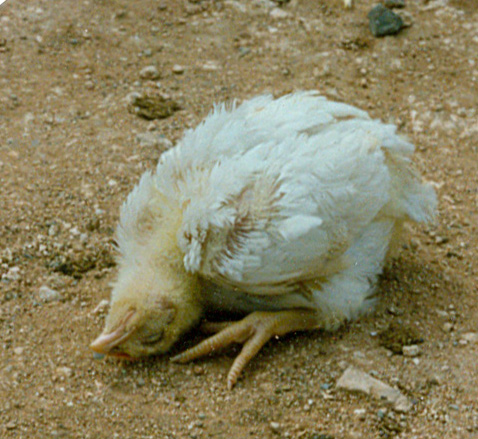Newcastle Disease Claims Thousands of Poultry and Country Fowl in Andhra Pradesh

By neucrad health india February 24, 2020
In the middle of February, about 2500 poultry fowls lost their life due to the Very Virulent Newcastle Disease (VVND). There are also reports of deaths of several country fowls in the area. Health officials confirmed the outbreak of the VVND disease, resulting in a tensed situation in many districts of Southern India. The highly contagious infection originated in East Godavari. It quickly transmitted to approximately a dozen villages in the West Godavari as well. Officials in East and West Godavari district are leaving no stones unturned in controlling the spread of the disease. Veterinary doctors identified the strain of VVND in dead birds as ‘velogenic’ which means it is highly virulent. Administrative officials of the Tanuku Municipality (the epicentre of the disease) has banned the sale of chicken meat for a week and cautioned people of the area from consuming bird meat.
What is the current situation of VVND disease in Andhra Pradesh?
Though VVND caused considerable panic in several districts if Andhra Pradesh, it is not a new infection for birds. However, this time veterinary staff are surprised with the outbreak as the virus affected commercial poultry farms. They get regularly vaccinated against the common avian infections, so it is quite uncommon to see poultry farms getting impacted with VVND. Dr NT Srinivasa Rao, joint director Animal Husbandry department reported that the outbreak was first noticed at Baduguvani Lanka village of Alamuru Mandal in East Godavari. Since VVND is a fast-spreading infection, the entire poultry rearing unit gets affected even if a single bird demonstrates the symptoms of the disease. Within a short period, the pathogen traversed around a dozen villages in the locality. Yerubandi Prasad, the farmer of the affected poultry farm, buried bodies of dead birds at an isolated location to control the spread of the disease.
What is Newcastle disease?
Newcastle disease is a viral infection common among domestic fowl, pigeons, parrots, and turkeys. There are also reports of ducks, quails, geese, and pheasants getting affected by this disease. It has occurred in several countries across the globe, including Asian, African, and some North and South American countries. There is no account of outbreaks in the USA and Canada. Though Newcastle disease is primarily an acute respiratory infection, it can also impact the nervous and digestive systems. Symptoms range from a mild drop in the egg-laying abilities of hens to respiratory distress, twisted necks, and severe diarrhoea causing collapsing of the fowl. The fatality of the medical condition depends on the strain causing the disease [1].
What do we know about the pathogen for Newcastle disease?
The pathogen for Newcastle disease or avian paramyxovirus serotype 1 is an RNA virus. It is one of the most contagious pathogens affects birds. According to the classical classification, there are three virulence groups of the infection- velogenic (highly virulent), mesogenic (moderately virulent), and lentogenic (less virulent). As already pointed out, this February, the velogenic strain affected Andhra Pradesh farms. Mortality of birds due to Newcastle disease depends on the strain of the virus, age, and the immune status of fowls [2].
How does the Newcastle disease transmit among birds?
The Newcastle disease virus gets transmitted through exhaled air, droppings, and respiratory discharges of infected birds. Fowls remain contagious during the incubation as well as the clinical stage. The pathogen can even remain active inside the eggs laid during the clinical phage of the infection.
Should we become worried about Newcastle disease?

Though Newcastle is a contagious viral infection, you can prevent it through vaccination. Most farms practise mass immunisation through the administration of vaccines in drinking water or sprays. However, if you do not perform it correctly, a significant percentage of birds remain unimmunised. Birds to human transmissions are possible but mostly remains limited to laboratory workers and vaccination teams. In human beings, the virus causes conjunctivitis and influenza-like symptoms.
So, we must remain cautious about the outbreak, instead of spreading panic in the area.
References:





